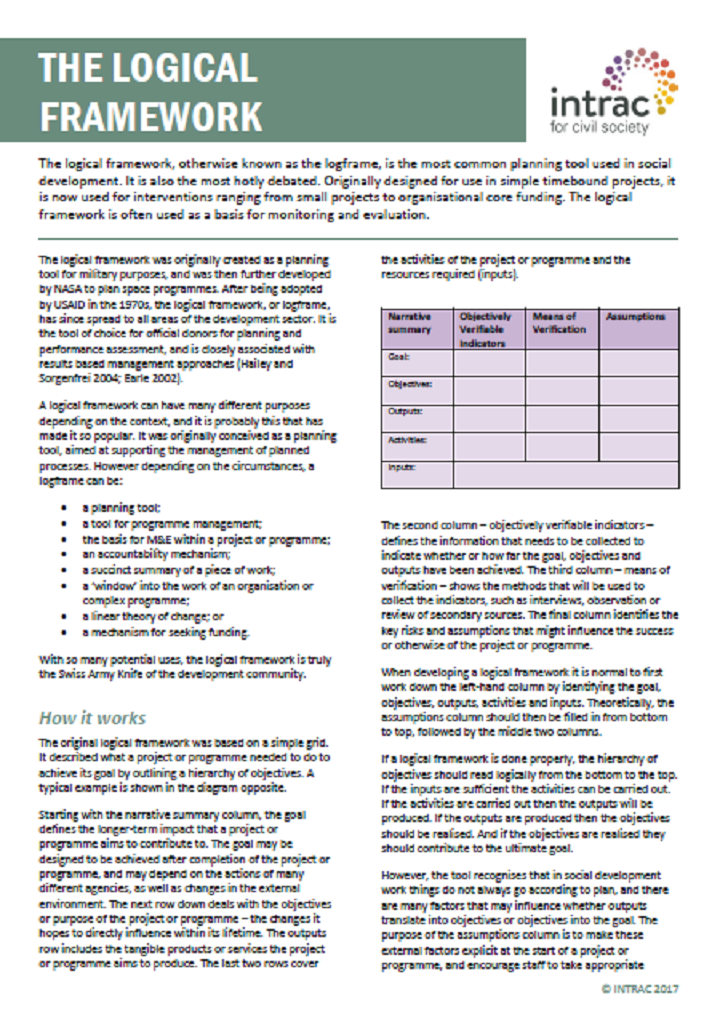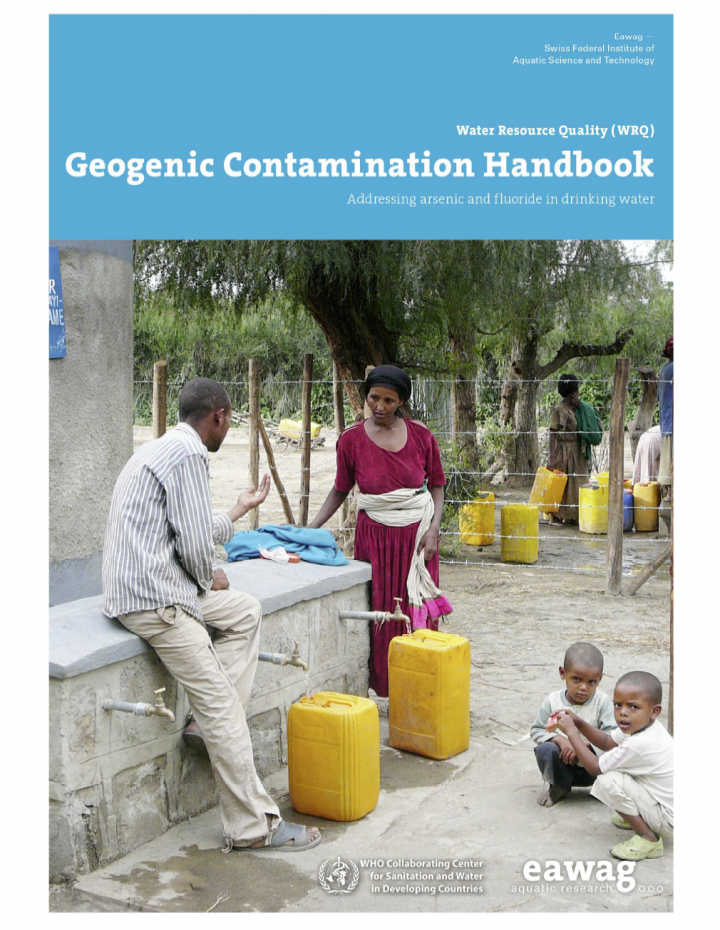Searching for information on Sanitation Workers?
The Sanitation Workers Knowledge + Learning Hub is the best source for all current news, trends, articles and updates on sanitation workers rights around the world.
Handwashing with soap is an effective way to prevent diseases and build healthy futures. For handwashing to be effective, it needs to be practiced consistently and thoroughly. Even when people have access to soap and water, and know how and why to wash their hands, many still do not properly wash their hands consistently at critical times. The handwashing behavior change challenge is not only to …
The logical framework, otherwise known as the logframe, is the most common planning tool used in social development. It is also the most hotly debated. Originally designed for use in simple timebound projects, it is now used for interventions ranging from small projects to organisational core funding. The logical framework is often used as a basis for monitoring and evaluation.
What's in this guide? Online communication platforms have become a lifeline for millions of people affected by natural disasters and armed conflicts: social media and messaging apps help maintain contact with family and friends, and provide access to information, such as where to find food, shelter or medical assistance. This information can directly influence how people prepare for, respond to …
The Fit for School (FIT) programme integrates school health and Water, Sanitation and Hygiene interventions, which are implemented by the Ministries of Education in four Southeast Asian countries. This paper describes the findings of a Health Outcome Study, which aimed to assess the two-year effect of the FIT programme on the parasitological, weight, and oral health status of children attending …
Poor WASH conditions are thought to be one of the main causes of child stunting. The household environment in which children develop and grow is highly related to their nutritional status. Direct and indirect pathways exist between WASH and stunting, from diarrheal diseases and Environmental Enteric Dysfunction (EED), to socio-economic conditions and time constraints to child care practices. The …
PURPOSE AND BACKGROUND
WHO recognizes that effective, integrated and coordinated communication is integral to carrying out WHO’s goal to build a better, healthier future for people all over the world. The purpose of this Framework is to describe a strategic approach for effectively communicating WHO information, advice and guidance across a broad range of health issues: from chronic health …
Several members of the Communicating with Disaster Affected Communities (CDAC) Network have recognised the need to work with rumours in their missions to prevent the loss of lives and alleviate suffering. Notably, Internews with their pioneering inter-agency model, the World Health Organisation and United Nations Office for the Coordination of Humanitarian Affairs have made considerable efforts …
It feels good to be clean. It feels good to live in a beautiful environment. It feels good not to get sick. Influencing health behaviour change seems like it should be simple. Present the logical evidence (information) for why changing a behaviour is worthwhile (washing hands kills germs) and the need for change should be obvious. But logic isn’t the only basis for making decisions about …
BabyWASH at World Vision is an initiative which aims to improve the integration of water, sanitation and hygiene (WASH) interventions with maternal, newborn and child health (MNCH), nutrition and early childhood development (ECD), to enable a more profound impact on child health outcomes in the first 1,000 days of life. The initiative was developed due to a recognised gap in the integration in …
The purpose of Including Children with Disabilities in Humanitarian Action is to strengthen the inclusion of children and women with disabilities, and their families, in emergency preparedness, response and early recovery, and recovery and reconstruction. This series of booklets provides insight into the situation of children with disabilities in humanitarian contexts, highlights the ways in …
This document outlines why proper incinerators are needed for effective waste management in health facilities. Construction of waste management facilities is increasingly the responsibility of WASH practitioners who may be unfamiliar with best practice. This document summarises the key issues to consider and signposts the main guidance available.
Appropriate management of municipal solid waste is critical for public health and environmental pro tection. With denser settlement patterns, the chal lenge and threat becomes more acute. Managing biowaste with appropriate recycling strategies can reduce waste amounts by more than 50%, and create economic opportunities. Value products from biowaste include soil amendment and fertilizer, …
This Campbell Systematic Review examines the effectiveness of different approaches for promoting handwashing and sanitation behaviour change, and factors affecting implementation, in low and middle-income countries. The review summarises evidence from 42 impact evaluations, and from 28 qualitative studies.
This evidence synthesis, commissioned by the Humanitarian Evidence Programme and carried out by a team from the Civil and Environmental Engineering Department of Tufts University, identifies, synthesizes and evaluates existing evidence of the impacts of water, sanitation and hygiene (WASH) interventions in disease outbreaks in 51 humanitarian contexts in 19 low and middle-income countries (LMICs).
The paradigm for identifying the beneficiaries and understanding their needs and requirements for delivery of WASH services has evolved over time. Initially, governments started with the overarching objective of providing universal access to WASH services. During the MDG period, there was increased thrust to understand the specific needs and requirements of different population segments, in order …
Diarrhoeal diseases are very common causes of death in low and middle-income countries. The aim for this systematic review was to show which promotional approaches might change handwashing and sanitation behaviour, and which implementation factors affect the success or failure of such promotional approaches.
This handbook focuses on the requirements of the implementer. It aims to provide a concise resource for approaching and handling geogenic contamination (primarily arsenic and fluoride) in groundwater used for drinking and cooking purposes. It providesinformation on water quality testing, different treatment options and practical guidelines, including draft questionnaires, on the integration of …
Clean water provision is a critical component of emergency response, and chlorination is widely used in emergencies to treat water. To provide responders with practical, evidencebased recommendations for implementing chlorination programmes and recommend areas for future research, we conducted a literature review of chlorination in emergencies, supplemented with a literature review on …
There are a number of circumstances in which it may be necessary to treat water at the point of use to remove or inactivate microbial pathogens. These include:
• failure of control measures, including lack of or improper disinfection and unsafe handling and storage;
• emergencies and disasters leading to inadequate sanitation, hygiene and protection of water sources;
• uncertain …
The fourth edition of the World Health Organization’s (WHO) Guidelines for drinking-water quality (GDWQ) builds on over 50 years of guidance by WHO on drinking-water quality, which has formed an authoritative basis for the setting of national regulations and standards for water safety in support of public health.
It is the product of significant revisions to clarify and elaborate on ways of …
The poor quality of many Colombian surface waters forces us to seek alternative, sustainable treatment solutions with the ability to manage peak pollution events and to guarantee the uninterrupted provision of safe drinking water to the population. This review assesses the potential of using riverbank filtration (RBF) for the highly turbid and contaminated waters in Colombia, emphasizing water …
The purpose of Including Children with Disabilities in Humanitarian Action is to strengthen the inclusion of children and women with disabilities and their families in emergency preparedness, response and early recovery, and recovery and reconstruction. This series of booklets provides insight into the situation of children with disabilities in humanitarian contexts, highlight the ways in which …
Ending Cholera—A Global Roadmap to 2030 operationalises the new global strategy for cholera control at the country level and provides a concrete path toward a world in which cholera is no longer a threat to public health. By implementing the strategy between now and 2030, the Global Task Force on Cholera Control (GTFCC) partners will support countries to reduce cholera deaths by 90 percent. …








































